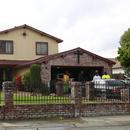Sacramento Demands Answers After Police Shoot Unarmed Black Man
Here’s what you’ll find on today’s show:
— 22-year-old Stephon Clark was shot and killed by police late Sunday night in Sacramento, California, in the backyard of his grandparents’ house. Clark, who is African-American, was living at his grandparents’ home at the time when police responded to reports of a man who had broken car windows and was hiding out in a backyard. Police were led to his location before firing off 20 shots at Clark, who they believed was brandishing a weapon. The only item discovered near his body was a cellphone.
— On Tuesday in Washington, President Trump met with Saudi Arabia’s Crown Prince Mohammed bin Salman to kick off the crown prince’s three-week, seven-city trip to the U.S. But Salman’s ambitions of modernization, striking oil and gas deals, and building on business connections in Silicon Valley ignore the realities of Saudi Arabia’s role in the war in Yemen and other human rights abuses. How is the media covering his trip and what is Salman likely to get out of it?
— Peruvian President Pedro Pablo Kuczynski announced his resignation on Wednesday. Opposition lawmakers allege that Kuczynski lied about payments from Odebrecht, a Brazilian conglomerate, to a boutique investment bank he owns. Oldebrecht is Latin America’s construction behemoth and is responsible for some of the region’s biggest infrastructure projects. But it’s also tied up in multiple corruption probes, including the payment of bribes not only in Brazil, but across 10 countries, including Peru.
— A new investigation by the Associated Press has revealed the extent to which reports of child abuse on American military bases languish in the system. The report focused on peer-on-peer sexual abuse at the military bases’ schools, which exist a kind of bureaucratic netherworld. The institutions are closely aligned with the military, but they are not subject to the laws that govern the armed forces.
— After recent revelations that 50 million Facebook profiles were harvested in a massive data breach, there are now new questions about who will rein in the social media giant and how it will protect the privacy of its users. Facebook is used by billions of people as the primary way to communicate with friends and family. For many others, Facebook is their sole connection to the internet. Will the fallout change the way people use the platform or force the company to change its business practices?
We want to hear your feedback so we can keep improving our website, theworld.org. Please fill out this quick survey and let us know your thoughts (your answers will be anonymous). Thanks for your time!
